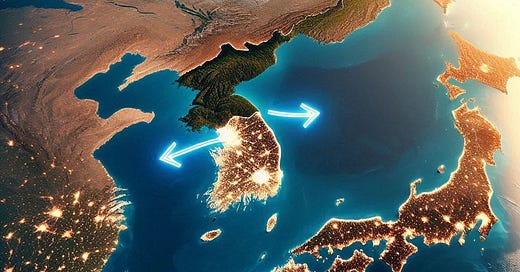If you ever doubt American won the Korean War more than seventy years ago, consider American force posture in South Korea. America no longer faces a desperate defense of South Korea. Now America can use bases in South Korea to resist common enemies away from the peninsula. And count on South Korean support.
Historically, the rationale for maintaining approximately 28,500 U.S. troops in South Korea has centered on deterring the North Korean threat. The Demilitarized Zone remains one of the most heavily fortified borders in the world, and Pyongyang’s continued development of nuclear and missile capabilities reinforces the enduring logic of forward-deployed deterrence. Yet U.S. strategic thinking is increasingly framing the Korean Peninsula as a strategic forward base—an “unsinkable aircraft carrier”—for broader power projection across the Indo-Pacific.
It has been a while since America's troops stood on the DMZ. They were pulled back as the balance between South Korea and North Korea shifted toward South Korea. This meant American troops not needed to defeat an invasion were no longer hostages to American air power.
The change in that balance has been clear for a long time, as I speculated that in a crisis South Korea could advance north of the DMZ to create a No-Launch Zone to protect South Korea's capital, Seoul, from conventional artillery bombardment.
Another change from the deterioration of North Korea's army was that the increasingly advanced and prosperous South Korea could redirect its navy to the blue water role to protect its vastly increased foreign trade.
So of course America can think of its bases in South Korea less as a force to defend South Korea—absent an invasion by China—and more as a power projection platform. Yeah, we won the Korean War. It looked like a defeat in 1953 when we accepted a stalemate at the DMZ. But over time South Korea advanced and North Korea starved and rotted. Today South Korea exports advanced weapons and ammunition to Europeans to hold off the Russians; and can now project power alongside America and Japan to bolster regional defense
So while this makes me nervous, it would be just one more in a long string of withdrawals:
An option being developed by the Pentagon is to pull out roughly 4,500 troops and move them to other locations in the Indo-Pacific region, including to Guam[.]
Two American divisions once stood on the DMZ, recall. Does this withdrawal of American troops reflect the lower need to defend a more capable South Korea? Or does it interfere with using South Korea as a power projection platform?
South Korea, long a consumer in American defense alliance, is now a producer of security that can benefit America outside of South Korea. But we have to be able to project power through it for that to matter.
NOTE: I made the image with Bing.




